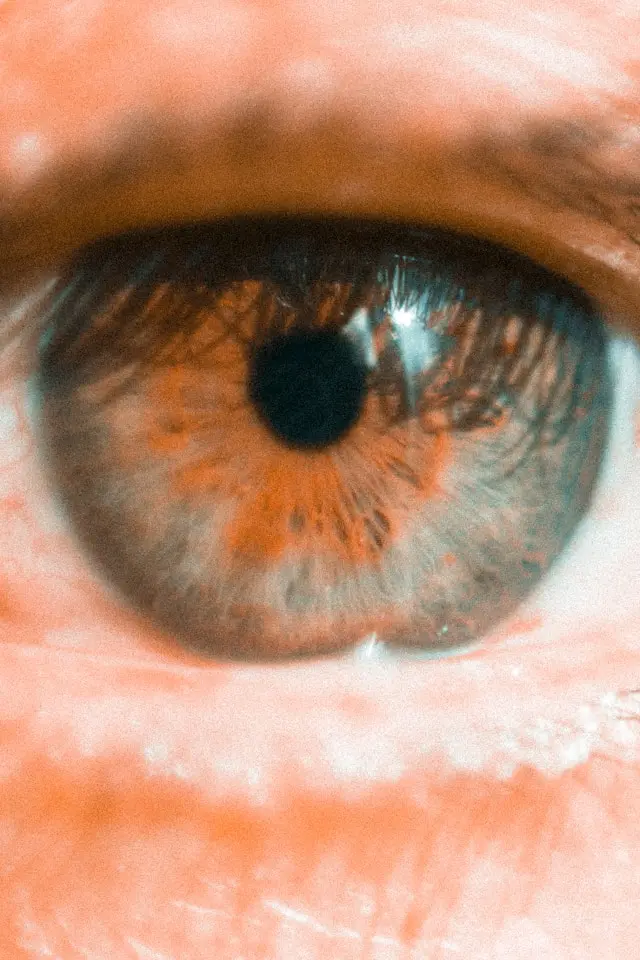I never had dry eyes until I started studying for my Master’s in Nutrition via on online program. A few of our textbooks have not been formatted well and had no option to increase the text size, so I have found myself squinting at 8-point font, trying to absorb difficult information as sentences dance on the screen and merge with each other in a chaotic blur. The results of rubbing my itchy, dry eyes? Styes. Lots of styes. And diagnosed dry eye disease.
Having gotten that under control last winter, enter my favorite season of fall. It, however, comes with one environmental drawback. Though a refreshing shift from the humidity of summer, the crispness that I love about autumn can also dehydrate us from the inside out. Again, after a summer of wishing someone could just wring me out lest I mildew, I adore this particular seasonal change.
But our bodies may need extra support during the season, and your eyes (which are part of your brain so deserve your keen attention!) may top the list. Dry, itchy eyes are common in the fall. For the first time ever, my boyfriend is also experiencing this unpleasant fall symptom and asked me to look up the culprit.
I’m not talking about full-blown allergic conjunctivitis or the environmental exposures that can exacerbate dry eye disease; I’m talking about itchy, dry eyes that only become problematic in otherwise happy eyes in the fall. And I found the answer.
An article by Rutgers University discusses how the unique distribution of allergenic pollens could shift in a warming world. Researchers at the Rutgers Environmental and Occupational Health Sciences Institute created a predictive model to simulate how climate change will affect the distribution of two leading allergens – oak and ragweed pollens – across the contiguous United States. The results were published in the journal Frontiers in Allergy.1
I live in NH where both oak and ragweed are plentiful. Amaranth and wormwood are also top allergens. So, if you want plants to blame, now you know.
The results of the Rutgers study showed that even moderate warming will trigger an earlier pollen season that will last longer throughout the U.S. The Northeast and Southwest will be more severely impacted, with mean concentrations of oak pollen increasing by more than 40 and ragweed by more than 20 percent.1
This, however, is not a blog about climate change but what to do if you experience irritated eyes.
Meet Macqui Berry
Maqui-berry extract (MBE) is gaining research attention in ophthalmology for its ability to improve signs and symptoms of dry eye disease and ocular surface inflammation (meaning also dry, itchy eyes due to allergen exposure). One study found that even in dry air, consumption of 30 and 60 mg/day of MBE significantly increased the amount of tear fluid, lubricating the eye and relieving discomfort. This also protects a dry eye from cornea gland damage.2
Previous studies also confirmed the positive effects of a standardized maqui berry extract called MaquiBright®, also known as BrightSight®, on dry eye disease, fatigue, and even stiff shoulders. A dose was 60 mg of MaquiBright® per day for 4 weeks had pronounced positive effects on eye discomfort and fatigue. Moreover, consumption showed no adverse effects,3 as can be the case with OTC or Rx eye drops.
In fact, macqui berry may improve glycemic and metabolic control (and, therefore, obesity); help in the prevention of cancer, cognitive decline, and dementia; prevention against oxidative stress, even in the case of cigarette smoking; and aid in the prevention of bone disorders.4
A number of supplements seem to contain MaquiBright®; I am not compensated by any supplement company and don’t endorse any. In fact, I since this is new information to me, I haven’t even tried it myself! Please let me know if you do by leaving your comments.
In good eye health,
Ally (a.k.a. since 3rd grade: Four Eyes)
- Itchy Eyes and a Runny Nose? It Could Be Climate Change. Accessed September 12, 2025. https://www.rutgers.edu/news/itchy-eyes-and-runny-nose-it-could-be-climate-change. Accessed September 12, 2025.
- Kundu G, Shetty R, D’Souza S, Gorimanipalli B, Koul A, Sethu S. Effect of maqui-berry extract in dry eye disease – A clinical and molecular analysis. Indian J Ophthalmol. 2023;71(4):1613-1618. doi:10.4103/IJO.IJO_2909_22. Accessed September 12, 2025.
- Yamashita S ichiro, Suzuki N, Yamamoto K, Iio S ichiro, Yamada T. Effects of MaquiBright® on improving eye dryness and fatigue in humans: A randomized, double-blind, placebo-controlled trial. Journal of Traditional and Complementary Medicine. 2019;9(3):172-178. doi:10.1016/j.jtcme.2018.11.001. Accessed September 12, 2025.
- García-Milla P, Peñalver R, Nieto G. A Review of the Functional Characteristics and Applications of Aristotelia chilensis (Maqui Berry), in the Food Industry. Foods. 2024;13(6):838. doi:10.3390/foods13060838. Accessed September 12, 2025.

